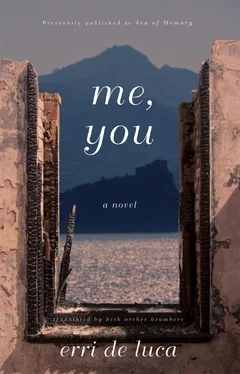Nicola was the only one who talked to me about the war. I would ask, and before answering me he would react to my insistence, “Si, capòtico.” It’s true, I was stubborn, but only about that. He would reknot the nylon line around a hook, coiling the long length of tackle without looking at me. While he spoke, his breathing came in time to the movement of his hands. He would hold on to part of the line while pulling open a knot with his teeth and the topic might be a snowy night guarding the ammunition dump, or else he might talk about a German reprisal against unarmed people while he swiftly stitched a torn net, his tone remaining flat as he related the story. History had become nothing but an accompaniment to work. Behind us was the island, in front were the afternoon ripples as the maestrale , the north wind, subsided. That was the present, most powerful of all, master of time, and Nicola’s voice yielded to the place and to the task at hand.
That Sarajevo family saved him after the armistice of the eighth of September *when the Germans imprisoned Italian soldiers in order to send them to work camps in Germany. The family took Nicola into their house and hid him, and when Tito took over they helped him return home.
I was the only person interested in those stories. After the war, the survivors hardened their silence, a callus on the dead skin of wartime. They wanted to live in a new world. Now, Germans were just people who came to the island for vacations. Nicola had nothing to do with them. Hotels and pensioni were far away from the fishermen’s beach, which gave off an unending stench of fish guts rotting in the sun. Nicola didn’t have to meet Germans, and he didn’t want to. He had known them; he didn’t want to hear that language with its guttural consonants.
The island was full of Germans, old, middle-aged — people who had been young during the war and now in their prosperity hid their former arrogance behind a fake joviality and the pretense of being merely tourists, never anything else. In organized tour groups and small bands they roamed the island from June to October, apopleptic from the sun, constipated from the lemonades, shiny from their sun oils like the baba au rhum at the Bar Calise.
They were the same ones. Nicola watched them from afar and when one of them asked for directions he replied with the only words he had learned: ich verstehe nicht , I don’t understand. He had seen them in Yugoslavia and no longer wanted to understand them. The islanders, on the other hand, spoke whatever little German was necessary for business.
Nicola stood with his back to the island and saw only those few who came across the short stretch of beach that lay between his feet and the sea.
I didn’t like the Germans either. They were the same ones I had found in the books about that infamous period, the ones who had let themselves be intoxicated and ruined by Hitler, and no defeat had been able to strip them of their arrogant madness. The defeated ones were the others, the ones who served them during their vacations on a southern island.
Where my aversion grew abstractly out of books, Nicola’s was made of flesh. Incapable of hostility, he reacted with outbursts of timidity. One day he told me that the year before, he had recognized a German soldier, one who had been in Sarajevo. They looked at each other, neither one spoke. But Nicola felt the teeth of war tear at his gut. He turned red with shame. He had been in church at the time, at Mass. He left without even crossing himself: “Me so’ mmiso scuorno pe’Ddio,” he was ashamed for God. “Adda tene’ pacienza pure int’a casa soia,” one had to have patience even in one’s own house. The word pacienza is particularly nice in Neapolitan because it contains the word pace , peace, within patience. I asked him if he had ever killed anyone. No reply. He was teaching me not to expect a reply to all my questions.
When Nicola ran into them on the island, he crossed to the other side of the street. I knew stories about the Warsaw ghetto where the Germans prohibited the Jews from looking them in the eye. That summer I started to stare at them, not as a challenge but in an effort to understand. It was rare for any of them to notice.

It was the summer of my sixteenth year, my emotions were on edge. Unlike my coevals, I was not attracted to girls of my own age. I liked older ones, an impossible desire. That summer, however, I did get my wish. I was the only one of my contemporaries to spend time with them.
That was thanks to Daniele, my uncle’s son, who was four years older than I. He was the head of a group of young men of good family who had scooters, and a few of them had boats. Though without such means himself, Daniele was nonetheless the born leader of any group. He was a guest in the house my parents rented, and slept in the same room with me. That summer he became aware of me. I can’t account for his interest, but that’s how it was. He taught me chords on the guitar, he took me to the place on the beach where his friends got together and let me stay with them. My skinny looks, intensified by my sudden growth, were not much to talk about — fuzz on my cheeks more yellow than blond, narrow eyes, a tight jaw that never relaxed. Perhaps he saw me as more mature or sensed that in his cousin an avalanche was gathering.
I did not go on their excursions to distant places on the island and rarely joined their evening get-togethers or the dances they held spontaneously wherever they went. But I did join them at the beach when I came back from fishing. Over the previous few years Daniele had begun staying out late and was little inclined to get up early. He stopped going out with his father and Nicola. I took his place. And so when I came back from fishing, I would go find him and he would ask me to tell him all about our day’s expedition.

That summer I had a baptism of blood caused by a moray eel. It was pulled up on the same line with a grouper. While Uncle and Nicola were busy with the fish, I tried to detach the hook from the moray’s throat. I squeezed its cheeks with my left hand to keep its mouth open. Just as I was getting the hook out, the moray wriggled. I lost my grip on its jaws and its teeth sank into my hand at the joint of the index finger. A moray doesn’t just bite; where it grabs hold it doesn’t let go. Once it sets its jaw, it doesn’t open it again. I managed not to scream, but tears welled in my eyes from the effort. When he finished with the grouper and Uncle resumed pulling up the line, Nicola noticed me and with one stroke of his knife beheaded the moray. Then he broke the jawbone, and only then took the teeth out of my hand, one by one. I kept looking at the sea while Nicola performed this ancient little operation, my wounded hand far from my thoughts. Pain was knocking but I wouldn’t open up. I had heard tales about what happened to me. I had previously experienced the venom of a weever in the sole of my foot and that of a scorpion fish in my palm. I was in a fishing boat and that was part of the deal. Uncle gave me a half smile between one armful of line and another, nodding his head. “Mo’ si’ pescatore,” now you’re a fisherman, Nicola said, when he finished rinsing my hand in seawater.
I didn’t really understand why masculinity meant having to ignore pain. I saw it exercised by men and tried to do the same when it came my turn. I understood that it was not a rejection of the body but the patience to endure it, a load on a beast of burden that is too heavy at times and can even kill, but up to that point you don’t complain. The body was a patient beast that men tamed with pride. The body was ruled by the unyielding codes of southern virility. The spines of the sea urchin that boys learned to pull out by themselves were left in by fishermen to be slowly absorbed beneath the skin. I was learning from them how to detach oneself from pain.
Читать дальше













